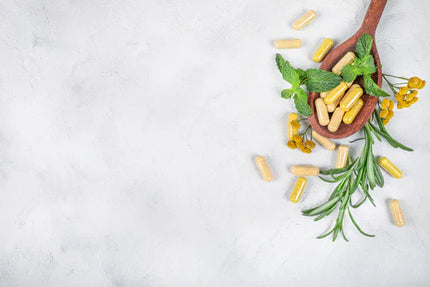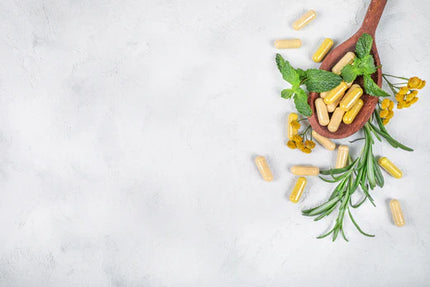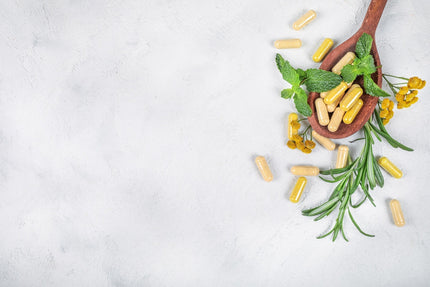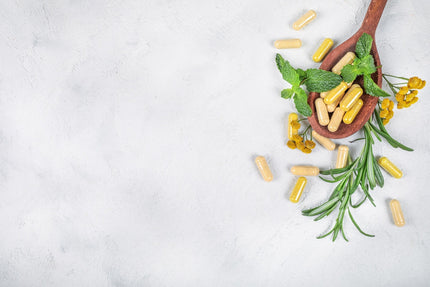Nutrients/Herbs That May Assist
Lavender oil
Lemon balm
Melissa officinalis, leaf extract
L-theanine
Camellia sinensis (green tea), leaf extract
Actions
- Modulate neural communication and support neuronal resilience
- Promote hypothalamic-pituitary-adrenal (HPA) axis and autonomic nervous system (ANS) homeostasis
- Enhance alpha brain wave activity
Clinical Applications
- Mixed anxiety and depression
- Anxiety and panic
Lavender Oil and Theanine for Anxiety, Panic and Low Mood
Background Technical Information
Anxiety and depression are highly prevalent in today’s society.[1-5] In fact, in 2017 3.2 million Australians were reported having an anxiety-like condition, with one in ten experiencing feelings of depression.[6] For more than 2,500 years physicians have used botanical medicines in the treatment of anxiety, panic attacks and depression.[7,8] The herb lemon balm, traditionally used for nervous disorders[9,10] was shown to improve resilience to stress whilst lowering anxiety, depression and sleep disturbances in human and animal clinical trials.[11,12] Likewise, L-theanine, an amino acid found in the leaves of the plant Camilla sinensis (green tea), provided anti-stress, anxiolytic and anti-depressant-like effects in both animal and human studies.[13-15] Equally, lavender oil is recognised for promoting mental wellbeing and reduced feelings of short and long term distress.[16-19] In animal and human studies lavender oil provided anxiolytic effects in the aftermath of stressful situations, markedly lowered anxiety-related restlessness and agitation, and exerted antidepressant effects.[20-23]
Actions
Modulate neural communication and support neuronal resilience
The anxiolytic effects of lavender oil result from an increase in extracellular serotonin and modulation of serotonin neurotransmission, particularly at the 5-HT1A receptor level.[5, 19, 23] The mood enhancing effects of lemon balm may be from the inhibition of monoamine oxidase, thereby supporting the serotonergic system, and inhibiting GABA transaminase, an enzyme involved in gamma aminobutyric acid (GABA) degradation.[9, 11, 12, 24]
L-theanine also has an affinity for glutamatergic receptors, being a modulator of both excitatory glutamate and inhibitory glycine, promoting a relaxed disposition.[13, 14, 25, 26] L-theanine’s regulatory effects on glutamate further influence GABA, where ingestion of L-theanine over two weeks lowered levels of glutamate and increased GABA in animals.[27] Interestingly, L-theanine increased levels of 5-HT and GABA in the central nervous system (CNS) within 20 to 30 minutes post ingestion.[28]
In addition, alterations in neurogenesis and neuroplasticity have been strongly implicated in the pathogenesis of mood disorders.[23, 26] Lavender oil enhanced neurogenesis and synaptogenesis as it heightened neurite outgrowth and increased the number of synapses in mature primary hippocampal neurons in vitro.[23] Lemon balm also promoted neurogenesis in a dose-dependent manner by increasing neuroblast proliferation and differentiation within the hippocampal dentate gyrus in animals.[9, 29] L-theanine supplementation in humans lead to a rise in serum brain derived neurotropic factor (BDNF) which was associated with improvements in dysphoric mood and anxiety scores, and an increase in hippocampal BDNF associated with antidepressant effects.[14, 15, 26, 30]
Promote hypothalamic-pituitary-adrenal (HPA) axis and autonomic nervous system (ANS) homeostasis
Well-established markers linked to a dysfunctional HPA axis and imbalanced ANS from the impact of stress on an individual include heart rate (HR), blood pressure, salivary secretory IgA (ssIgA), salivary alpha-amylase (sAA), cortisol measurements and heart rate variability.[25, 26, 31-33] The anxiolytic effects of lavender oil come from its regulation of the HPA axis thereby influencing plasma stress hormone levels, and modulating parasympathetic nervous system activity to balance the ANS.[33] Additionally, lemon balm improved mood and the stress response as it dose-dependently reduced serum corticosterone levels in animals,[9, 11] whilst decreasing HR and heart palpitation frequency in animals and humans.[34] Lastly, L-theanine significantly lowered stress hormones and modulated HPA axis activity in stress-inducing models, whilst providing anti-stress effects both acutely and long term at a dose of 200 mg daily.[14, 25, 26] At a dose of 200 mg twice daily, L-theanine lowered subjective stress and reduced sAA levels in students.[26]
Enhance alpha brain wave activity
Alpha brain waves are associated with elevated visual performance, improved accuracy and reaction whilst promoting a relaxed state.[13,14, 28, 35]Evidence suggests diminished alpha brain wave activity is associated with anxiety, and increasing alpha wave magnitude resulted in a calming effect in highly anxious individuals.[36] L-theanine elevated oscillatory brain activity in the alpha band in humans 30 minutes after ingestion, which accompanied an increase in neurotransmitters levels.[25] Further, L-theanine acted as a relaxing agent without causing drowsiness, slowed reflexes or impaired concentration.[13, 14, 28, 35]
Clinical Applications
Mixed anxiety and depression
Some individuals experiencing anxiety and depression do not meet the full diagnostic criteria for these conditions, and thus fall into the diagnosis of a mixed anxiety and depressive disorder (MADD).[4] Fortunately, lavender oil, lemon balm and L-theanine has been shown in several clinical trials (Table 1) to remarkably improve symptoms of MADD.
Table 1: Lavender oil, lemon balm and L-theanine in treatment of MADD
Anxiety and panic
Common symptoms associated with anxiety include hypervigilance, poor concentration, fatigue, and sleep disturbances.[27, 37] For many, anxiety will be accompanied by panic attacks, defined as unexpected abrupt surges of intense fear or discomfort.[1, 38] Symptoms experienced during a panic attack include sweating, heart palpitations and accelerated HR.[39]
Clinical trials (Table 2) demonstrate lavender oil, lemon balm and L-theanine provide both anxiolytic and anti-stress effects, attenuating feelings of anxiety and panic.
Table 2: Lavender oil, lemon balm and L-theanine in treatment of anxiety and anxiety-associated symptoms.
Safety Information
Disclaimer: In the interest of supporting Healthcare Practitioners, all safety information provided at the time of publishing is in accordance with Natural Medicine Database (NATMED PRO), renowned for its professional monographs which include a thorough assessment of safety, warnings, and adverse effects.
For further information on specific interactions with medications, please contact Clinical Support on 1800 777 648, or via email, anz_clinicalsupport@metagenics.com
Pregnancy and Lactation
- Insufficient reliable information available; avoid using.[43]
Contraindications
- Contraindicated with Ephedrine, Nadolol (Corgard) and Atorvastatin (Lipitor); avoid this combination.[43]
References
[1] Andrews G, Bell C, Boyce P, et al. Royal Australian and New Zealand college of psychiatrists clinical practice guidelines for the treatment of panic disorder, social anxiety disorder and generalised anxiety disorder. Australian & New Zealand Journal of Psychiatry. 2018;52(12):1109-72. doi:10.1177/0004867418799453
[2] Kasper S, Gastpar M, Müller WE, et al. Silexan, an orally administered lavandula oil preparation, is effective in the treatment of 'subsyndromal' anxiety disorder: a randomized, double-blind, placebo controlled trial. Int Clin Psychopharmacol. 2010;25(5):277-87. doi:10.1097/YIC.0b013e32833b3242
[3] Garakani A, Murrough JW, Freire RC, et al. Pharmacotherapy of anxiety disorders: current and emerging treatment options. Front Psychiatry. 2020;11:595584. doi:10.3389/fpsyt.2020.595584
[4] Kasper S, Volz HP, Dienel A, et al. Efficacy of silexan in mixed anxiety-depression- a randomized, placebo-controlled trial. Eur Neuropsychopharmacol. 2016;26(2):331-340. doi:10.1016/j.euroneuro.2015.12.002
[5] Rahmati B, Kiasalari Z, Roghani M, et al. Antidepressant and anxiolytic activity of Lavandula officinalis aerial parts hydroalcoholic extract in scopolamine-treated rats. Pharm Biol. 2017;55(1):958-965. doi:10.1080/13880209.2017.1285320
[6] Mental health [Internet]. ABS. 2018 Dec 12th [Cited 2021 October 20th]. Available at: https://www.abs.gov.au/statistics/health/mental-health/mental-health/latest-release
[7] Sarris J, Panossian A, Schweitzer I, et al. Herbal medicine for depression, anxiety and insomnia: a review of psychopharmacology and clinical evidence. Eur Neuropsychopharmacol. 2011;21(12):841-60. doi:10.1016/j.euroneuro.2011.04.002
[8] Glas G. A conceptual history of anxiety and depression. Medical Psychiatry. 2003;18;21:1-48.
[9] Yoo DY, Choi JH, Kim W, et al. Effects of Melissa officinalis L. (lemon balm) extract on neurogenesis associated with serum corticosterone and GABA in the mouse dentate gyrus. Neurochem Res. 2011;36(2):250-7. doi:10.1007/s11064-010-0312-2
[10] Kennedy DO, Little W, Scholey AB. Attenuation of laboratory-induced stress in humans after acute administration of Melissa officinalis (Lemon Balm). Psychosom Med. 2004;66(4):607-13. doi:10.1097/01.psy.0000132877.72833.71
[11] Haybar H, Javid AZ, Haghighizadeh MH, et al. The effects of Melissa officinalis supplementation on depression, anxiety, stress, and sleep disorder in patients with chronic stable angina. Clin Nutr ESPEN. 2018;26:47-52. doi:10.1016/j.clnesp.2018.04.015
[12] Shakeri A, Sahebkar A, Javadi B. Melissa officinalis L. - A review of its traditional uses, phytochemistry and pharmacology. J Ethnopharmacol. 2016;188:204-28. doi:10.1016/j.jep.2016.05.010
[13] Dietz C, Dekker M. Effect of green tea phytochemicals on mood and cognition. Curr Pharm Des. 2017;23(19):2876-2905. doi:10.2174/1381612823666170105151800
[14] Hidese S, Ogawa S, Ota M, et al. Effects of L-theanine administration on stress-related symptoms and cognitive functions in healthy adults: a randomized controlled trial. Nutrients. 2019;11(10):2362. doi: 10.3390/nu11102362
[15] Miodownik C, Maayan R, Ratner Y, et al. Serum levels of brain-derived neurotrophic factor and cortisol to sulfate of dehydroepiandrosterone molar ratio associated with clinical response to L-theanine as augmentation of antipsychotic therapy in schizophrenia and schizoaffective disorder patients. Clin Neuropharmacol. 2011;34(4):155-60. doi:10.1097/WNF.0b013e318220d8c6
[16] Schuwald AM, Nöldner M, Wilmes T, et al. Lavender oil-potent anxiolytic properties via modulating voltage dependent calcium channels. PLoS One. 2013;8(4):e59998. doi:10.1371/journal.pone.0059998
[17] Rahmati B, Kiasalari Z, Roghani M, et al. Antidepressant and anxiolytic activity of Lavandula officinalis aerial parts hydroalcoholic extract in scopolamine-treated rats. Pharm Biol. 2017;55(1):958-965. doi:10.1080/13880209.2017.1285320
[18] Sayed AM, Morsy S, Tawfik GM, et al. The best route of administration of lavender for anxiety: a systematic review and network meta-analysis. Gen Hosp Psychiatry. 2020;64:33-40. doi:10.1016/j.genhosppsych.2020.02.001
[19] Baldinger P, Höflich AS, Mitterhauser M, et al. Effects of Silexan on the serotonin-1A receptor and microstructure of the human brain: a randomized, placebo-controlled, double-blind, cross-over study with molecular and structural neuroimaging. Int J Neuropsychopharmacol. 2014;18(4):pyu063. doi:10.1093/ijnp/pyu063
[20] Schuwald AM, Nöldner M, Wilmes T, et al. Lavender oil-potent anxiolytic properties via modulating voltage dependent calcium channels. PLoS One. 2013;8(4):e59998. doi:10.1371/journal.pone.0059998
[21] Rahmati B, Kiasalari Z, Roghani M, et al. Antidepressant and anxiolytic activity of Lavandula officinalis aerial parts hydroalcoholic extract in scopolamine-treated rats. Pharm Biol. 2017;55(1):958-965. doi:10.1080/13880209.2017.1285320
[22] Yap WS, Dolzhenko AV, Jalal Z, et al. Efficacy and safety of lavender essential oil (Silexan) capsules among patients suffering from anxiety disorders: a network meta-analysis. Sci Rep. 2019;9(1):18042. doi:10.1038/s41598-019-54529-9
[23] Müller WE, Sillani G, Schuwald A, et al. Pharmacological basis of the anxiolytic and antidepressant properties of Silexan®, an essential oil from the flowers of lavender. Neurochem Int. 2021;143:104899. doi:10.1016/j.neuint.2020.104899
[24] Araj-Khodaei M, Noorbala AA, Yarani R, et al. A double-blind, randomized pilot study for comparison of Melissa officinalis L. and Lavandula angustifolia Mill. with fluoxetine for the treatment of depression. BMC Complement Med Ther. 2020;20(1):207. doi:10.1186/s12906-020-03003-5
[25] Kimura K, Ozeki M, Juneja LR, et al. L-Theanine reduces psychological and physiological stress responses. Biol Psychol. 2007;74(1):39-45. doi:10.1016/j.biopsycho.2006.06.006
[26] Rothenberg DO, Zhang L. Mechanisms underlying the anti-depressive effects of regular tea consumption. Nutrients. 2019;11(6):1361. doi:10.3390/nu11061361
[27] Chesnut M, Harati S, Paredes P, et al. Stress markers for mental states and biotypes of depression and anxiety: a scoping review and preliminary illustrative analysis. Chronic Stress (Thousand Oaks). 2021;5:24705470211000338. doi:10.1177/24705470211000338
[28] Higashiyama A, Htay HH, Ozeki M, et al. Effects of l-theanine on attention and reaction time response. Journal of Functional Foods. 2011;3(3):171-8. doi:10.1016/j.jff.2011.03.009
[29] Naseri M, Arabi Mianroodi R, Pakzad Z, et al. The effect of Melissa officinalis L. extract on learning and memory: Involvement of hippocampal expression of nitric oxide synthase and brain-derived neurotrophic factor in diabetic rats. J Ethnopharmacol. 2021;276:114210. doi:10.1016/j.jep.2021.114210
[30] Yoneda Y, Kawada K, Kuramoto N. Selective upregulation by theanine of Slc38a1 expression in neural stem cell for brain wellness. Molecules. 2020;25(2):347. doi:10.3390/molecules25020347
[31] Yoto A, Motoki M, Murao S, et al. Effects of L-theanine or caffeine intake on changes in blood pressure under physical and psychological stresses. J Physiol Anthropol. 2012;31(1):28. doi: 10.1186/1880-6805-31-28
[32] Williams JL, Everett JM, D'Cunha NM, et al. The effects of green tea amino acid L-theanine consumption on the ability to manage stress and anxiety levels: a systematic review. Plant Foods Hum Nutr. 2020;75(1):12-23. doi:10.1007/s11130-019-00771-5
[33] Bradley BF, Brown SL, Chu S, et al. Effects of orally administered lavender essential oil on responses to anxiety-provoking film clips. Hum Psychopharmacol. 2009;24(4):319-30. doi:10.1002/hup.1016. PMID: 19382124
[34] Draginic N, Jakovljevic V, Andjic M, et al. Melissa officinalis L. as a nutritional strategy for cardioprotection. Front Physiol. 2021;12:661778. doi:10.3389/fphys.2021.661778
[35] Saeed M, Naveed M, Arif M, et al. Green tea (Camellia sinensis) and l-theanine: medicinal values and beneficial applications in humans-a comprehensive review. Biomed Pharmacother. 2017;95:1260-1275. doi:10.1016/j.biopha.2017.09.024
[36] Hou Y, Zhang S, Li N, et al. Neurofeedback training improves anxiety trait and depressive symptom in GAD. Brain Behav. 2021;11(3):e02024. doi:10.1002/brb3.2024
[37] Gautam S, Jain A, Gautam M, et al. Clinical practice guidelines for the management of generalised anxiety disorder (GAD) and panic disorder (PD). Indian J Psychiatry. 2017;59(Suppl 1):S67-S73. doi:10.4103/0019-5545.196975
[38] Cackovic C, Nazir S, Marwaha R. Panic Disorder. In: StatPearls [Internet]. Treasure Island (FL): StatPearls Publishing; 2021 Jan-. Available from: https://www.ncbi.nlm.nih.gov/books/NBK430973/
[39] Alijaniha F, Naseri M, Afsharypuor S, et al. Heart palpitation relief with Melissa officinalis leaf extract: double blind, randomized, placebo controlled trial of efficacy and safety. J Ethnopharmacol. 2015;164:378-84. doi:10.1016/j.jep.2015.02.007
[40] Woelk H, Schläfke S. A multi-center, double-blind, randomised study of the Lavender oil preparation Silexan in comparison to Lorazepam for generalized anxiety disorder. Phytomedicine. 2010;17(2):94-9. doi:10.1016/j.phymed.2009.10.006
[41] Kasper S, Anghelescu I, Dienel A. Efficacy of orally administered Silexan in patients with anxiety-related restlessness and disturbed sleep--A randomized, placebo-controlled trial. Eur Neuropsychopharmacol. 2015;25(11):1960-7. doi:10.1016/j.euroneuro.2015.07.024
[42] Scholey A, Gibbs A, Neale C, et al. Anti-stress effects of lemon balm-containing foods. Nutrients. 2014;6(11):4805-21. doi:10.3390/nu6114805
[43] Natural Medicines Database. AusDi; 2024. Accessed September 20, 2024. https://ausdi.hcn.com.au/




